
The Reynard 2KQ was a Le Mans prototype built by Reynard Motorsport and used by various racing teams in sports car racing from 2000 to 2004. [1]

The Reynard 2KQ was a Le Mans prototype built by Reynard Motorsport and used by various racing teams in sports car racing from 2000 to 2004. [1]
The 2KQ was originally developed as the LMP900 vehicle in late 1999. The LMP900 class was the major prototype racing class in the Le Mans 24 Hours and American Le Mans Series in the early 2000s. However, during development, Reynard decided to also launch the prototype for the smaller LMP675 class in order to be able to address a larger customer base. The main distinguishing features of the carbon and aluminum monocoque-equipped racing cars were engine power and weight. The LM675 cars, which weigh only around 760 kg (the weight limits were constantly being adjusted at Le Mans – 2000: 765 kg, 2001: 788 kg, 2002: 759 kg, 2003 and 2004: 761 kg) featured 2-liter 4- Cylinder engines used. The LMP900 vehicles, which weighed around 940 kg, had 4-liter 10-cylinder or 8-cylinder mid-mounted engines. [2]
The first vehicles were delivered to the customer teams as early as January 2000. The 2KQ made its racing debut in the LMP900 version at the 24 Hours of Daytona in February of the same year. The car - which was entered by Johansson Matthews Racing - was driven by team owners Stefan Johansson and Jim Matthews. The British Guy Smith and the American Mimo Gidley were hired for this. The Johansson-Matthews 2KQ was powered by a Judd GV4 10-cylinder engine. In the race, after many technical problems, the quartet finished 23rd overall after starting from fourth on the grid. [3]
For the 2000 Le Mans 24-hour race, the vehicles were not only given the additional designation LM, which meant that the racing cars were in the starting lists as 2KQ-LM but also improved rear wings. A total of five 2KQs were at the start. Two were entered by ORECA in the LPM900 class, plus the Johansson-Matthews car, also in the large prototype class. However, the first Le Mans race for these vehicles was not really successful. Yannick Dalmas got stuck in one of the ORECA-2KQs in the first lap due to a lack of oil pressure. The second ORECA car, driven by Didier André, Didier Theys, and Jeffrey Van Hooydonkdid not get past 20th place overall. The US car also retired after an engine failure. The ORECA cars were powered by an 8-cylinder Chrysler engine. The French ROC team entered two 2KQ in the LMP675 class. This was the first appearance of the Volkswagen brand in the 24-hour race. A 2-liter VW 4-cylinder engine ran in both Spyders. However, both cars failed due to engine failure. [4]
After ORECA switched to the Dallara SP1 in 2001, the 2KQ disappeared from the large prototype class. However, ROC and Noël del Bello trusted in the vehicle until the end of 2004 and continued to use it in the LMP675 class. The greatest success for the 2KQ was class victory at the 2001 Le Mans 24-hour race. Jordi Gené, Jean-Denis Delétraz, and Pascal Fabre finished fifth overall in a ROC-2KQ. [5]
Lola Cars International Ltd. was a British race car engineering company in operation from 1958 to 2012. The company was founded by Eric Broadley in Bromley, England, before moving to new premises in Slough, Buckinghamshire and finally Huntingdon, Cambridgeshire, and endured for more than fifty years to become one of the oldest and largest manufacturers of racing cars in the world. Lola Cars started by building small front-engined sports cars, and branched out into Formula Junior cars before diversifying into a wider range of sporting vehicles. Lola was acquired by Martin Birrane in 1998 after the unsuccessful MasterCard Lola attempt at Formula One.

A Le Mans Prototype (LMP) is the type of sports prototype race car used in the 24 Hours of Le Mans, FIA World Endurance Championship, IMSA SportsCar Championship, European Le Mans Series and Asian Le Mans Series. Le Mans Prototypes were created by the Automobile Club de l'Ouest (ACO). The technical requirements for an LMP include bodywork covering all mechanical elements of the car. Currently, there are three classes within Le Mans Prototypes, designated LMP1, LMP2, and LMP3.

The 71st 24 Hours of Le Mans was a non-championship 24-hour automobile endurance race held for Le Mans Prototype and Grand Touring cars from 14 to 15 June 2003 at the Circuit de la Sarthe close to Le Mans, France before approximately 220,000 people. It was the 71st edition of the 24 Hour race, as organised by the automotive group, the Automobile Club de l'Ouest (ACO) since 1923. A test day was held seven weeks prior to the race on 4 May.

The 2002 24 Hours of Le Mans was an automobile endurance race held for Le Mans Prototype and Grand Touring cars from 15 to 16 June 2002 at the Circuit de la Sarthe, close by Le Mans, France. It was the 70th running of the event, as organized by the automotive group, the Automobile Club de l'Ouest (ACO) since 1923. A test day was held five weeks prior to the race on 5 May. The No. 1 Audi Sport Team Joest car of Tom Kristensen, Frank Biela and Emanuele Pirro won the race overall and Audi's third consecutive victory in Le Mans, extending back to the 2000 event.

The 2001 24 Hours of Le Mans was the 69th Grand Prix of Endurance, and took place on 16 and 17 June 2001.
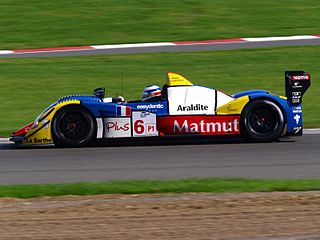
Courage Compétition was a racing team and chassis constructor company now owned by Oreca, based in Le Mans, France near the Circuit de la Sarthe. It was founded by Yves Courage, a French race driver who ran hillclimbs before founding the company. Following the purchase of Courage by Oreca in 2007, Yves Courage has refounded the company as Courage Technology in 2010, attempting to develop electric racing cars.

The Nissan R391 is a prototype racing car built by Nissan and their motorsports counterpart Nismo for competition at the 1999 24 Hours of Le Mans. It was a replacement for the R390 GT1, which was no longer legal in its production-based class.

Élan Motorsport Technologies is an American enterprise that serves as an umbrella company containing the race car engineering, development and manufacturing companies owned by American racing and automotive company conglomerate Panoz Motor Sports Group. Élan engineers, designs and builds Panoz-branded race cars and components, since its founding it has also acquired several manufacturers, including famous Formula Ford builders Van Diemen and IndyCar Series constructor G-Force. Élan-built cars have successfully competed in the American Le Mans Series, Le Mans Series, IMSA Prototype Lites and various other championships, racing series and types of professional racing throughout the world. It designs, develops and manufactures full line race cars, i.e. chassis, bodies, components and engines for professional racing competition for a variety of segments and classes.
Advanced Engine Research, Ltd. is an auto racing engine manufacturer based in Basildon, Essex, England. Established in 1997, AER has developed winning engines for a number of high-profile international race series in sports car, prototype racing, rallying, touring car, and open wheel racing. They have designed engines derived from road car platforms, but their emphasis is on clean sheet designed engines with a focus on electronics and turbochargers. Their engines have raced in the 24 Hours of Le Mans, the World Endurance Championship (WEC), the European Le Mans Series (ELMS), the United SportsCar Championship (TUSC), GP3, British Touring Car Championship (BTCC), Nissan/Renault World Series, Grand-Am, Paris Dakar and FIA Sportscar Championship. They have worked with a number of manufacturers including Mazda, Ford, Hyundai, MG/Rover, Nissan, and Toyota. In 2012, AER developed and built Formula One turbo test engines to current rules and in July 2012, AER was chosen as engine partner and supplier to the new GP3 racing series.
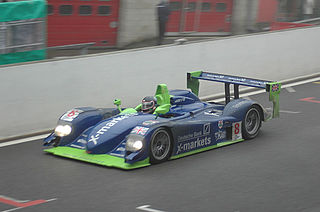
The Dallara SP1, also known as the Chrysler LMP, was a Le Mans Prototype built by Italian firm Dallara. Initially used as part of Chrysler Corporation's attempt to win the 24 Hours of Le Mans, the cars were later sold to customers for use series such as the FIA Sportscar Championship and Le Mans Series.

The MG-Lola EX257 is a Le Mans Prototype built by Lola for the MG car company for their attempt to compete again at the 24 Hours of Le Mans in 2001. The car has had many years of mixed success since its introduction, even in privateer hands.
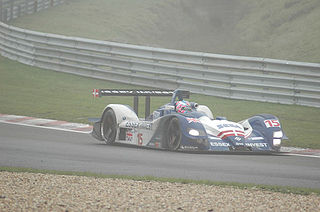
The Reynard 02S was a Le Mans Prototype race car built by Reynard Motorsport in 2002. Intended to replace the failed Reynard 2KQ prototype, the 02S would end up becoming the final new design from Reynard as the company went bankrupt prior to the project's completion.
Muscle Milk Pickett Racing was a motorsports group from Indianapolis, Indiana. The team was founded in 2007 by CytoSport co-founder and former IMSA GT Championship driver Greg Pickett. Since 2007, Pickett's team has competed in the United SportsCar Championship, the American Le Mans Series, the 24 Hours of Le Mans and the IMSA GT3 Cup Challenge. The team officially closed in 2014.

The 80th 24 Hours of Le Mans was an 24-hour automobile endurance race for Le Mans Prototype and Le Mans Grand Touring Endurance cars held from 16 to 17 June 2012 at the Circuit de la Sarthe close to Le Mans, France before 240,000 spectators. It was the 80th running of the event, as organised by the automotive group, the Automobile Club de l'Ouest (ACO) since 1923. The race was the third round of the 2012 FIA World Endurance Championship, with 30 of the race's 56 entries contesting the championship. A test day was held two weeks prior to the race on 3 June.
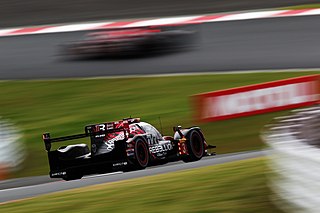
Rebellion Racing is a Swiss racing team that competes in endurance racing. The team competed in the 2011 Intercontinental Le Mans Cup season and won the LMP1 teams' title in the 2011 Le Mans Series season. The team started as an association between Speedy Racing and Sebah Racing, which began in 2008. Rebellion Racing's team principal is Alexandre Pesci and the team manager is Bart Hayden.
KW Motorsport Ltd have a wide range of engineering consultancy in Champ car and Le Mans series including the design of the Nasamax, Protan and Creation AutoSportif chassis that are based on Reynard Motorsports original products. The Company is based alongside its sister company KW Special Projects Ltd at Reynard Park, Brackley, England, where it is currently working on the adaptation and regeneration of MARCH Engineering’s iconic Le Mans prototype, the MARCH 75S.

The Audi R10 TDI, usually abbreviated to R10, is a diesel-powered racing car from the German car manufacturer Audi. The car dominated Le Mans, winning each year from its 2006 introduction until it was replaced by the R15 in 2009. It was designed and constructed for sports car racing in the Le Mans Prototype LMP1 class of the 24 Hours of Le Mans, and other similar endurance races. The car was unveiled December 13, 2005 at 12:00 CET, and went on to win both its maiden race at the 2006 12 Hours of Sebring in March, and the June 2006 24 Hours of Le Mans.
Intersport Racing is a former American auto racing team founded by Jon Field. The team was based in Dublin, Ohio. They previously operated two Oreca FLM09 sports cars in the American Le Mans Series. At current, the company has transitioned into diet supplements.

The Oreca 07 is a Le Mans Prototype built by French manufacturer Oreca to meet the 2017 FIA and ACO LMP2 regulations. It made its official race debut in the opening round of the 2017 IMSA WeatherTech SportsCar Championship, the 24 Hours of Daytona, and its FIA World Endurance Championship debut at the 2017 6 Hours of Silverstone. The car is the successor to the Oreca 05.
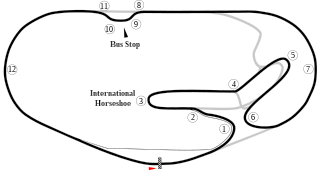
The 2019 24 Hours of Daytona was an International Motor Sports Association (IMSA)-sanctioned endurance sports car race held at the Daytona International Speedway combined road course in Daytona Beach, Florida, on January 26–27, 2019. It was the 57th running of the race, and the first of 12 races in the 2019 IMSA WeatherTech Sportscar Championship, and the first of four rounds of the 2019 Michelin Endurance Cup. The race was ended ahead of the 22nd Hour, due to heavy rainfall. The race was won overall by Renger van der Zande, Jordan Taylor, Fernando Alonso, and Kamui Kobayashi in the #10 Wayne Taylor Racing Cadillac DPi-V.R. The LMP2 class was won by the #18 DragonSpeed Oreca 07, piloted by Pastor Maldonado, Roberto Gonzalez, Sebastián Saavedra and Ryan Cullen. The GTLM class was won by the #25 BMW Team RLL BMW M8 GTE of Connor de Phillippi, Augusto Farfus, Philipp Eng, and Colton Herta. The GTD class was won for a second consecutive year by the #11 GRT Grasser Racing Team Lamborghini Huracan GT3 Evo of Rolf Ineichen, Mirko Bortolotti, Rik Breukers, and Christian Engelhart.
| Wikimedia Commons has media related to Reynard 2KQ . |